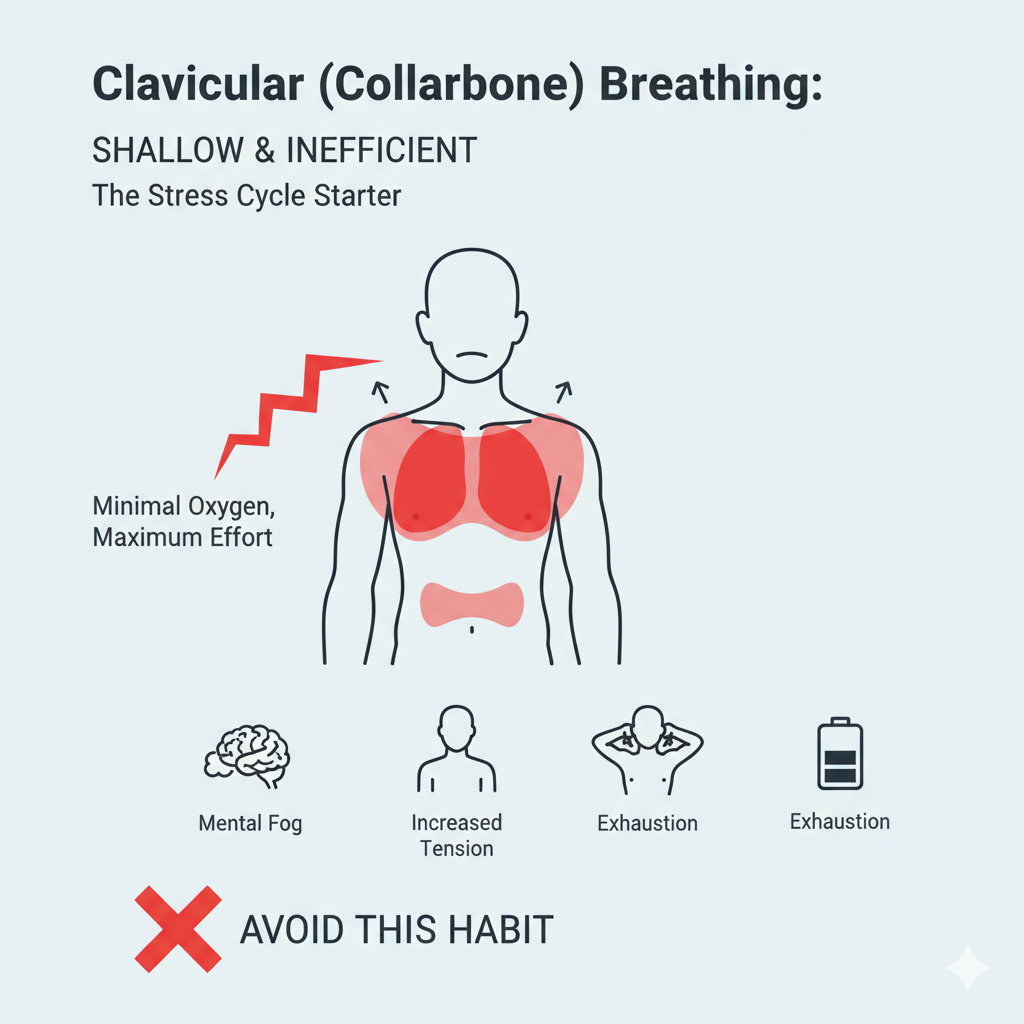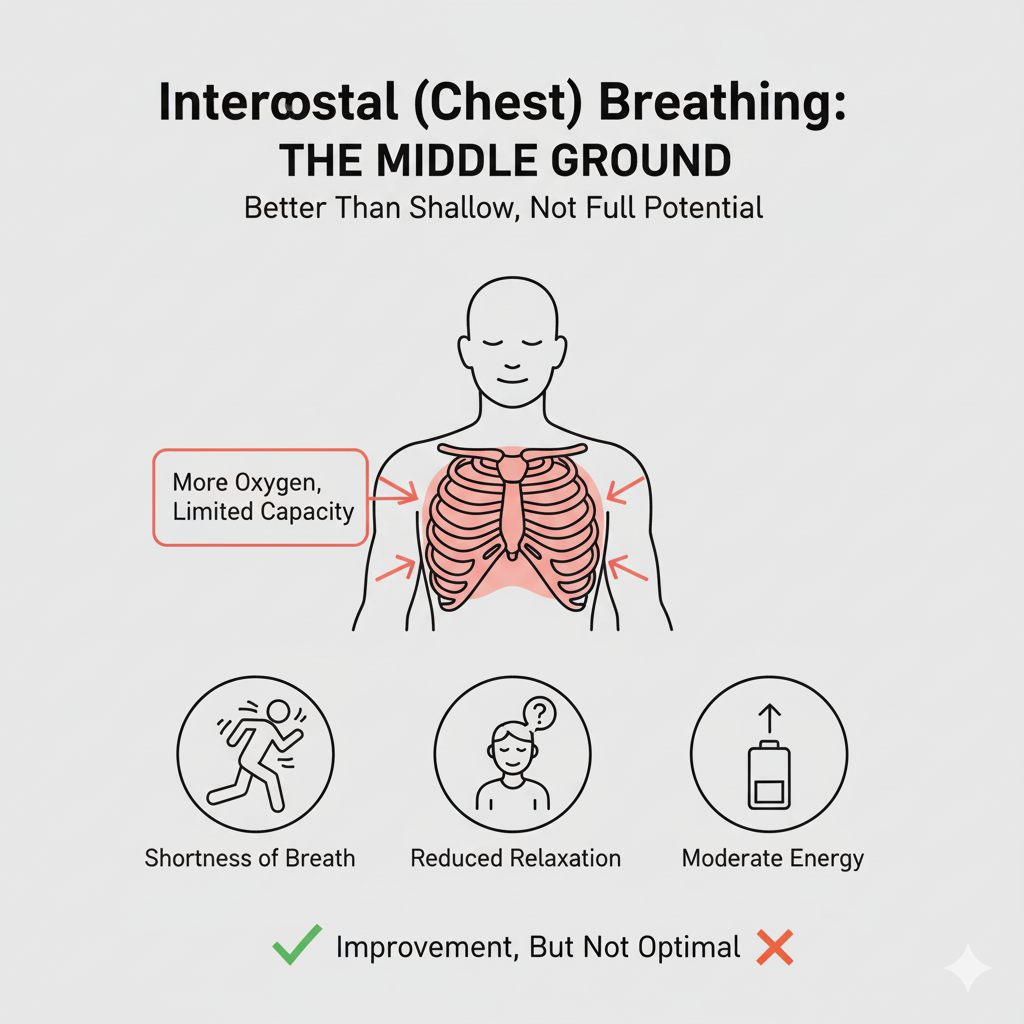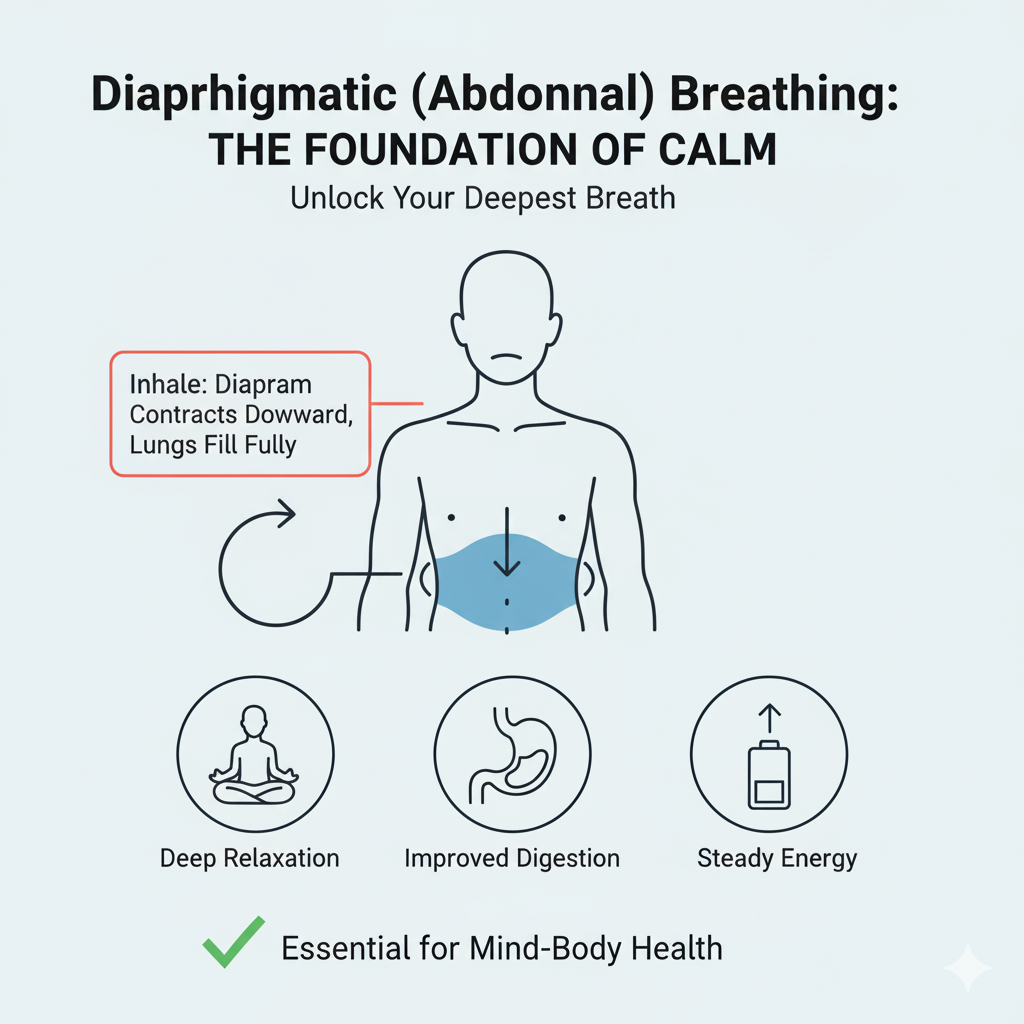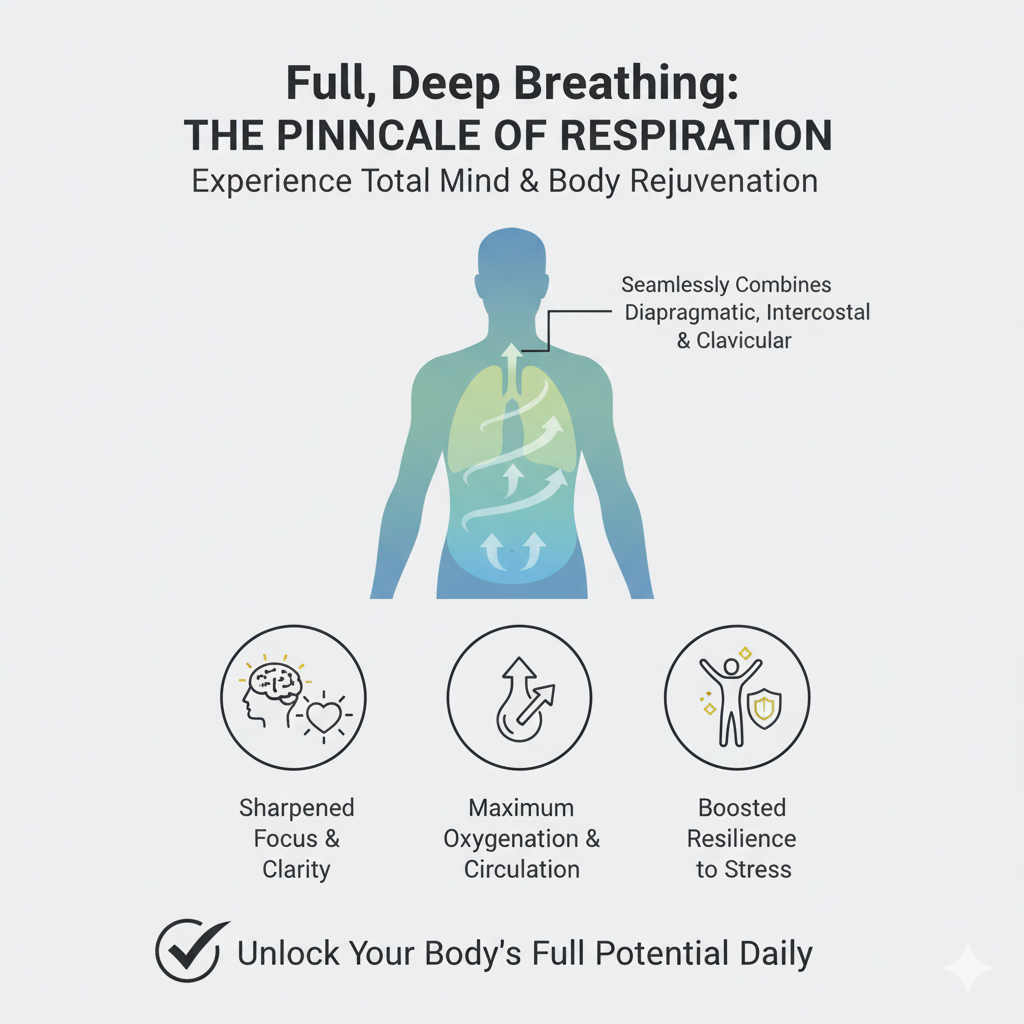Deep Breathing Benefits: Transform Your Health in 5 Minutes a Day (Science-Backed, 2025)
Discover the Deep Breathing Benefits that can transform your mind and body in just minutes a day. This simple yet powerful practice can lower stress hormones by up to 20%, improve digestion, boost mental clarity, and strengthen your immune system—all without expensive treatments or equipment. Backed by modern research, deep breathing isn’t just relaxation—it’s one of the most effective breathing exercises for health and longevity you can master.
Most people use only a small portion of their lung capacity, unknowingly limiting their body’s oxygen, vitality, and focus. In this guide, you’ll uncover science-backed stress relief techniques that deliver instant calm, improve circulation, and activate your body’s natural healing response. You’ll also learn how proper breathing enhances digestion, supports heart health, and sharpens cognitive performance.
Whether you seek quick stress relief, balanced energy, or a holistic way to support overall wellness, mastering conscious breathing offers one of the most accessible paths to better health. Let’s dive into the techniques that unlock your body’s full potential—one breath at a time.

Experience Immediate Stress Relief Through Strategic Breathing
When stress strikes, your body defaults to shallow, rapid breathing that actually amplifies anxiety and tension. The good news? Deep breathing benefits for stress relief are both immediate and scientifically validated. Research demonstrates that structured breathing techniques lower cortisol—your primary stress hormone—faster than many other quick interventions, including short walks or stretching. Explore more on our blog on nervousness in women and how to control naturally.
The secret lies in the vagus nerve, a critical pathway connecting your brain to your body’s “rest and digest” system. When you practice controlled breathing, you directly stimulate this nerve, triggering a cascade of calming physiological responses. Your heart rate slows, blood pressure drops, and stress hormones begin to decrease within seconds.
The 4-7-8 technique stands out as one of the most effective breathing exercises for health and instant calm. This method acts as a natural tranquilizer for your nervous system, and you can practice it anywhere—at your desk, in traffic, or before an important meeting.
Here’s how to practice the 4-7-8 technique:
- Inhale quietly through your nose for 4 seconds, allowing your abdomen to expand
- Hold your breath comfortably for 7 seconds, letting oxygen saturate your bloodstream
- Exhale completely through your mouth for 8 seconds, releasing tension with the breath
- Repeat this cycle three more times for maximum effect
Most people report feeling noticeably calmer within two minutes. For lasting results, practice this technique twice daily—once upon waking and once before bed. Consistency transforms this quick fix into a powerful long-term tool for managing stress and building resilience.
Boost Your Cardiovascular Health With Targeted Breathing Practices
Cardiologists increasingly recognize that specific breathing exercises for health offer direct benefits to your heart and circulatory system. Your diaphragm, when used properly, functions as a secondary pump that enhances blood flow throughout your body. This mechanical action is one of the most underappreciated deep breathing benefits for physical wellness.
When you practice deep, controlled breathing, your heart doesn’t work alone. The rhythmic expansion and contraction of your diaphragm assists venous return—the process of blood flowing back to your heart from your extremities. This improved circulation means nutrients reach your cells more efficiently and waste products are removed more quickly, supporting optimal organ function.
Harvard Health studies confirm that slow, deliberate breathing can lower blood pressure significantly by reducing stress hormones and relaxing blood vessel walls. For people with hypertension or those at risk for cardiovascular disease, incorporating daily breathing practice offers a safe, medication-free complement to traditional treatments. Even healthy individuals benefit from the enhanced circulation and reduced strain on the cardiovascular system. Learn more on our blog on how to strengthen the heart naturally.
To maximize these benefits of deep breathing exercises for your heart, aim for 6-10 breaths per minute—significantly slower than the typical 12-20 breaths most people take. This slower pace gives your circulatory system time to fully exchange oxygen and carbon dioxide while allowing your heart to work more efficiently. Practice this paced breathing for just 10 minutes daily to support your cardiovascular health naturally.
The 4-7-8 Breathing Technique: A Natural Tranquilizer for Your Nervous System
Not all breathing techniques are created equal. Understanding the different types of breathing empowers you to choose techniques that deliver the greatest deep breathing benefits for your specific needs. Most people unconsciously cycle through various breathing patterns throughout the day, often defaulting to the least effective methods during moments of stress or fatigue.

Clavicular (Collarbone) Breathing represents the shallowest and least efficient breathing pattern. During clavicular breathing, you lift your shoulders and collarbone to draw air only into the uppermost portion of your lungs.
This method delivers minimal oxygen while requiring maximum effort, often leaving you feeling exhausted rather than energized. Unfortunately, many people default to this pattern when anxious or stressed, creating a counterproductive cycle that increases tension and mental fog.
Recognizing and avoiding this habit is the first step toward claiming the full benefits of deep breathing exercises.

Intercostal (Chest) Breathing improves upon clavicular breathing by expanding your ribcage outward, allowing more oxygen to enter your system. While this represents progress, chest breathing alone still limits your lung capacity and oxygen intake.
People who rely primarily on this pattern often experience shortness of breath during physical activity and may struggle to achieve deep relaxation.
Intercostal breathing serves as a middle ground—better than shallow collarbone breathing but still falling short of your lungs’ true potential.
Diaphragmatic (Abdominal) Breathing unlocks the foundation of optimal respiration and represents where the most significant deep breathing benefits begin to emerge. In this technique, your diaphragm—a powerful dome-shaped muscle beneath your lungs—contracts downward as you inhale, creating space for air to fill the deepest, most efficient parts of your lungs. Your abdomen expands outward as your lungs fill from bottom to top. This breathing pattern activates your parasympathetic nervous system, naturally promoting relaxation, improved digestion, and steady energy throughout the day. Athletes, singers, meditation practitioners, and stress management experts all rely on diaphragmatic breathing because it strengthens respiratory muscles, supports optimal oxygenation, and creates an immediate sense of calm.


Full, Deep Breathing represents the pinnacle of respiratory practice, combining clavicular, intercostal, and diaphragmatic methods into one seamless, complete breath.
This technique engages your entire lung capacity, filling your body with oxygen from your lower abdomen up through your chest to your collarbones. Full breathing purifies your blood most completely, maximizes circulation, and invigorates both body and mind simultaneously.
Even practicing this method for just 5-10 minutes daily can reset your nervous system, sharpen your focus, and dramatically improve your resilience against stress.
To practice full breathing: Sit comfortably with your spine straight. Place one hand on your abdomen and one on your chest. Inhale slowly through your nose, first allowing your belly to rise, then feeling your ribcage expand, and finally sensing a gentle lift in your upper chest. Exhale slowly and completely in reverse order, emptying from top to bottom. This complete breath cycle delivers the most comprehensive breathing exercises for health benefits available.

The Surprising Link Between Your Breath, Your Gut, and Your Immune System
One of the most overlooked deep breathing benefits is its direct impact on digestion and immune function. Breathing does more than supply oxygen—it determines how efficiently your body digests food and converts it into usable energy. Deep, diaphragmatic breathing stimulates the digestive tract, improves gut motility, enhances nutrient absorption, and supports immune resilience. This connection is reinforced by research on increasing digestive power, which highlights breath awareness, posture, and timing as key drivers of digestive efficiency.
Here’s a critical metabolic fact most people miss: after digestion, nutrients travel through the bloodstream to the lungs, where oxygen activates them into cellular energy. When breathing remains shallow, oxygen supply becomes limited—even with a nutrient-rich diet. As a result, the body struggles to convert food into energy, increasing the likelihood of fatigue, digestive sluggishness, and fat storage. Deep breathing, therefore, plays a foundational role in metabolic efficiency, energy balance, and digestive health.
Scientific evidence further supports this connection. Research examining the effects of diaphragmatic breathing shows that it directly increases gut motility—the muscular contractions that move food through the digestive tract. The rhythmic movement of the diaphragm gently massages internal organs, stimulating digestion and reducing bloating, constipation, and indigestion. This makes diaphragmatic breathing a powerful, natural digestive aid.
Immune benefits extend even further when breathing occurs through the nose rather than the mouth. The nose breathing benefits include filtering pathogens through nasal hairs and mucous membranes, warming and humidifying incoming air, and optimizing oxygen exchange. Nasal breathing also increases nitric oxide production, which improves circulation, enhances oxygen delivery, and provides antimicrobial protection that strengthens immune defense.
These effects compound during sleep. Sleep Foundation findings from 2024 show that nasal breathing can reduce snoring by up to 50%, improving sleep quality. Better sleep enhances immune response and recovery, creating a positive feedback loop where breathing, digestion, energy production, and immunity continuously reinforce one another.
Transform Your Daily Routine With Practical Breathing Integration
Understanding the theory behind breathing exercises for health means little without practical application. The most powerful breathing practices are those you can seamlessly integrate into your existing daily routine, turning ordinary moments into opportunities for enhanced well-being.
Morning Activation: Before reaching for your phone or getting out of bed, practice 60 seconds of diaphragmatic breathing. Place your hand on your abdomen and take five slow, complete breaths, feeling your belly rise with each inhale. This simple practice oxygenates your system, activates your parasympathetic nervous system, and sets a calm, intentional tone for your day. These morning moments deliver the benefits of deep breathing that influence your stress response and mental clarity for hours.
Pre-Meal Priming: Take three deep breaths before eating any meal. This practice stimulates your vagus nerve, which signals your digestive system to prepare for food by increasing enzyme production and gut motility. This 15-second habit maximizes nutrient absorption and reduces digestive discomfort—a practical application of the breathing exercises for health that costs nothing but delivers measurable results.
Desk Reset: Set a reminder to practice the 4-7-8 technique every two hours during work. This breaks the cycle of shallow, stress-driven breathing that accumulates throughout the workday, preventing the afternoon energy crash many people experience. Your focus will sharpen, your posture will improve, and you’ll access the mental clarity that comes from proper oxygenation.
Evening Wind-Down: Practice five minutes of full, deep breathing one hour before bed. Dim the lights, sit comfortably, and focus on slow, complete breaths that fill your lungs entirely. This signals your body that it’s time to transition from the day’s activities to rest and recovery, improving sleep quality and allowing your body to maximize overnight healing and restoration.
The cumulative benefits of deep breathing exercises emerge not from occasional heroic efforts but from consistent, mindful practice woven into the fabric of your daily life. Even brief sessions of 60-90 seconds, repeated throughout the day, create profound shifts in your physical health, mental state, and overall resilience.
Ready to experience these transformative benefits firsthand? Start with just one technique from this guide today. Whether you choose the quick stress-relief of the 4-7-8 method, the foundational practice of diaphragmatic breathing, or the comprehensive approach of full breathing, you’re taking a powerful step toward enhanced health, vitality, and well-being. Your breath is always with you, always available, and always ready to serve as your most accessible tool for transformation. The only question is: will you use it?
Frequently Asked Questions: Deep Breathing Benefits
I Exercise Already – Do I Really Need a Breathing Practice? (Spoiler: Yes, Here’s Why)
Absolutely. While exercise offers immense physical health benefits, breathing exercises for health provide unique and complementary advantages. Exercise is a beneficial stressor that temporarily raises cortisol before triggering adaptation and recovery. Deep breathing works directly on your nervous system to lower cortisol and induce calm during the practice itself. Think of them as a powerful partnership: exercise strengthens your stress response capacity, while breathing manages stress in real-time and accelerates recovery.
Can deep breathing actually improve memory and focus?
Yes, the connection is well-established. By improving circulation and oxygen delivery to your brain, deep breathing benefits include providing the fuel your cognitive functions need for optimal performance. Your brain uses approximately 20% of your body’s oxygen despite representing only 2% of your body weight. The calming effect also reduces the mental fog associated with stress and anxiety, leading to clearer thinking, better decision-making, and enhanced memory consolidation.
I get dizzy when practicing deep breathing. What should I do?
Dizziness typically indicates you’re breathing too forcefully or too quickly, leading to temporary hyperventilation. The solution is gentleness. Don’t force huge breaths—focus instead on smooth, controlled rhythm. Ensure your exhale is longer than your inhale, as in the 4-7-8 technique. If dizziness persists, shorten your practice duration or simply observe your natural breath without trying to change it. As your body adapts, you can gradually increase the depth and duration of your practice.
How long before I see results from a breathing practice?
The calming deep breathing benefits manifest literally within seconds or minutes of your first session. However, for lasting transformations like lower baseline blood pressure, improved digestion, better sleep consistency, and enhanced immune function, most people notice significant changes after 2-4 weeks of daily practice. Even 5-10 minutes daily creates measurable improvements when practiced consistently.
What’s the single most important benefit of proper breathing?
While all benefits of deep breathing exercises interconnect, most experts emphasize stress management as the foundation. Because chronic stress contributes to high blood pressure, poor digestion, weakened immunity, sleep problems, and cognitive decline, effectively managing stress through breathing creates a positive ripple effect across every aspect of your well-being. Master your breath, and you master your stress response—unlocking countless downstream benefits for your entire system.
